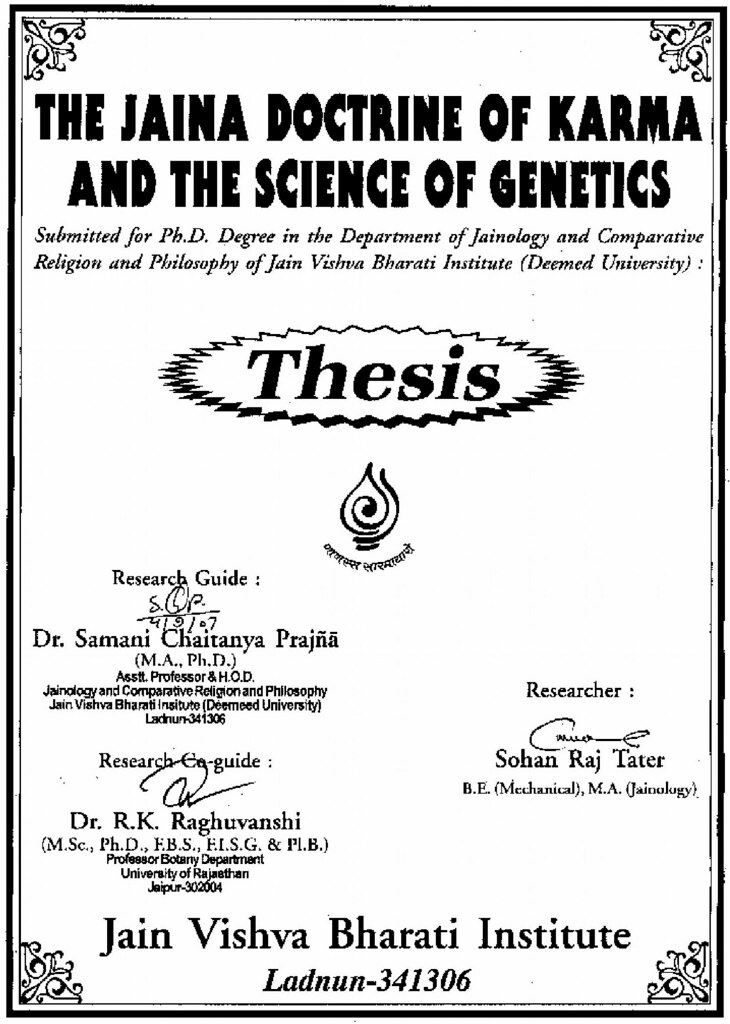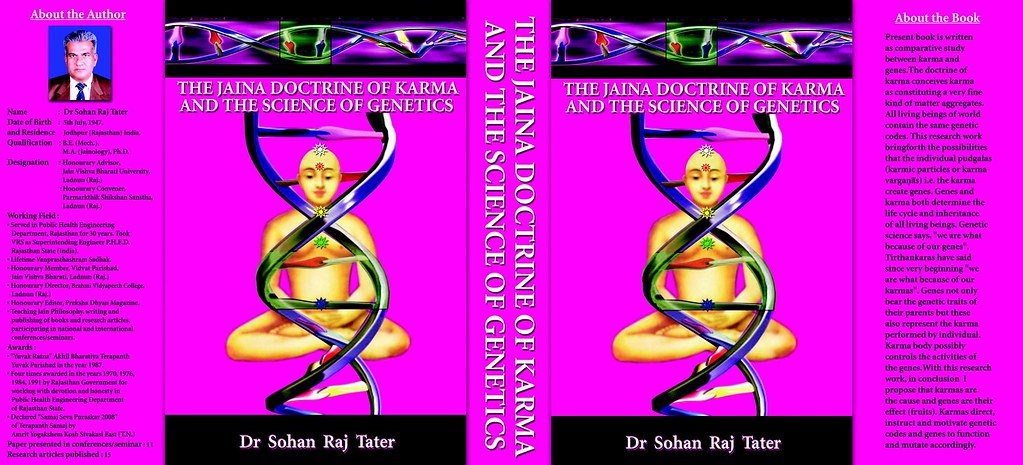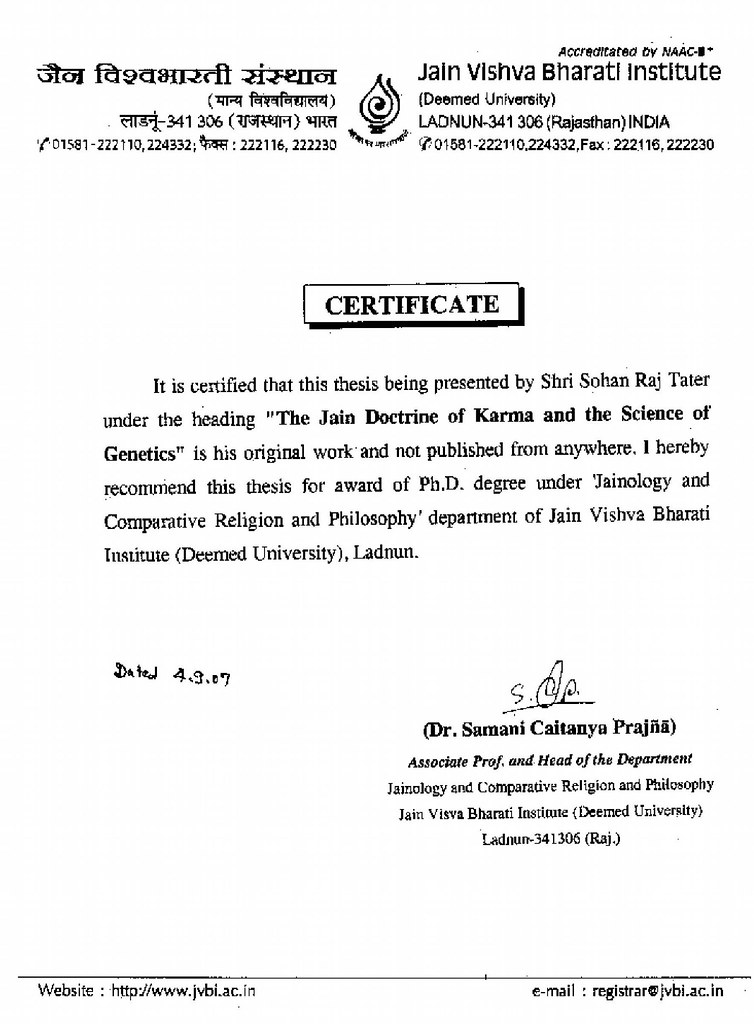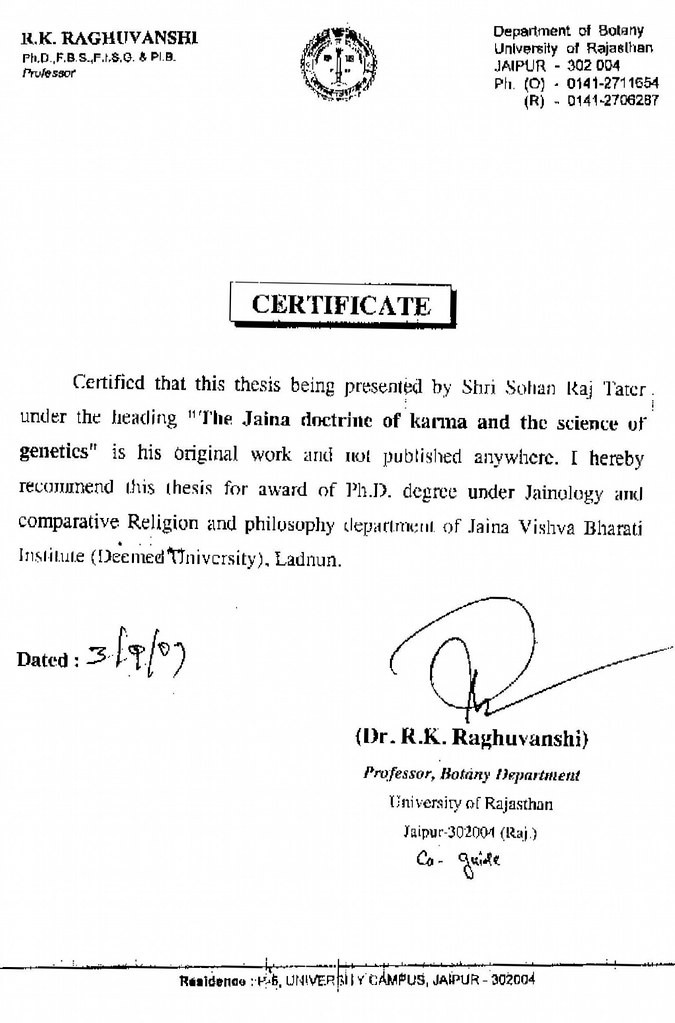JAIN VISHVA BHARATI UNIVERSITY

 Dr. Sohan Raj Tater
Dr. Sohan Raj Tater
 Cover of the Book by Dr. Sohan Raj Tater, Advisor JVB University, Ladnun, India
Cover of the Book by Dr. Sohan Raj Tater, Advisor JVB University, Ladnun, India
ACKNOWLEDGEMENT
I have great feeling for those dignities who motivated, guided and blessed me during my research journey, which cannot be expressed in words. Even then I feel my moral duty to pay gratitude to those honourable persons and scholars who co-operated with me in completing this research work in a proper way and with in the stipulated time period.
I place on record my sincerest gratitude to the builder of my fate, His Holiness Acharya Shri Mahapragyaji, Yuvacharyashri Mahashraman, and honourable Sadhvipramukhashriji and chief Niyojika Sadhvi Vishrutvibhaji, only with whose blessings I could succeed in this research work. I am grateful to Munishri Mahendrakumarji who inspired me time to time to do research work on this particular subject.
I received time to time guidance of Samani Mangal Pragyaji honourable Vice Chancellor and Shri Jagatram Bhattacharya, Registrar of Jaina Vishva Bharati Institute (Deemed University) Ladnun. I pay sincerest gratitude for Dr. Samani Chaitanya Pragyaji Associate Professor and Head of the Department Jainology and Comparative Religion and Philosophy, Jaina Vishva Bharati Institute (Deemed University) Ladnun and professor R.K. Raghuvanshiji, Professor, Botany Department, University of Rajasthan, Jaipur for their invaluable guidance as guides without which the thesis for my Ph.D. would have been a Herculean task for me. My sincerest thanks to Dr. B.R. Dugar, Director Research JVBI, Dr. Ashok Jain former H.O.D. Jainology, Dr. S. RamŒrŒo Assistant Professor, Botany Department, Jainarayan Vyasa University, Jodhpur and Dr. Anandaprakash Tripathi for their kind co-operation in this research work.
I am grateful to officers of libraries-Granthagar JVBI Ladnun, L.D. Institute Ahmedabad, Laharchand Bhogilal Bhartiya Vidya Shodh Sansthan, Delhi and mumukshu sisters of Parmarthik Shikshan Sanstha Ladnun who provided me all facilities for reading scriptures, books and magazines related to the science of karmaand the science of the genetics. I am thankful to Shri Rajesh Jain Student of M.C.A., JVBI, who co-operated me in getting scientific datas from different websites and Shri Nitesh Soni for computer composing work.
I take this opportunity to acknowledge my obligation to Ýr´ Mohan computer composer who composed this thesis well in time with least mistakes. I am grateful to Shri Dungarmalji, Shri Nirmal Khater, Shri Laxmi Narayan Soni, Shri Ritesh Jain, Shri Badriprasad and Shri Ramdas of Parmarthik Shikshan Sanstha Ladnun who fully co-operated me in this research work.
I am thankful to my wife Mrs. Laxmi Devi, sons - Basant, Naresh, Bhupesh and daughter-in-laws - Saroj, Anita and Lalita who kept me free from all homely botherations for completing this research work with full concentration.
At the end I pay highly my high regards to all those scholars whose books proved helpful directly or indirectly to this research work. I am presenting this research work before the world of scholars, research students and literature readers who are the best judges of the degree of success achieved in this effort and whose satisfaction will be my best reward.
Sohan Raj Tater
Editors Note:
This dissertation contains diacritics which are essential for Jainologists. To introduce this work here, we edited the following PREFACE according to standard letters. Please find the Original PREFACE in the download list at the end of this serial.
PREFACE
The term karma is derived from the root 'krn karane' by adding the suffix 'manin' to the root and the common meanings of the term are - action, worth doing, implementation, duty, act, profession, tendency, etc. So whatever is done falls under the category karma. The term karma stands for two different meanings viz.: action and the subtle aggregates of the karmic matter. All types of movements, whether physical or mental, are known as actions. Apart from it, in Jaina Philosophy the term 'karma' denotes the subtle aggregates of the karmic matter, which are attracted and assimilated by the soul.
Philosophy is dominated by religions in India. This is the reason why all the theistic religions here have acknowledged the existence of the power called karma or something equivalent to it which affects, covers and blunts the natural powers, attributes and purity of the soul. Different Philosophies talk of it by different names e.g. Vedanta Philosophical system calls it deception i.e. ignorance. Samkhya thought calls it prakrti (the nature) or samskara. Yoga Philosophy uses "karma asaya" or klesa etc. words for it. The term 'adrsta' (unseen) and samskara used in Nyaya school of thought also represent the same. The Buddhists call karma as 'vasana' (predispositions) and 'avijnapti' (non-knowledge). 'Dharma-dharma' the term used in Vaisesika Philosophy is also equivalent to the word karma used in Jaina Philosophy.
The 'pasa' (snare/fetter) employed in Saiva school of Philosophy is also synonymous to the word 'karma' as used in Jaina Philosophy. The 'apurva' (singular/unique) of the Mimamsa school of Philosophy is also used to denote the same concept. Fate, meritorious action, sin etc., are numerous words that are commonly used in Philosophical scriptures. In Jaina canonical literature along with the word karma, the terms such as 'karmaphala', karmaraja etc. are also used.
The law, which regulates the action of karma, is based on the principle of "cause and effect.“ The saying „as you sow so you reap“ presents the whole Doctrine in a nutshell. Every action, whether mental, vocal or physical, is a sowing of the 'seed', or in the technical language of the Jaina Philosophy, the engendering of karma. In the act of sowing the seed or engendering the karma, the soul has the choice of acting or retaining from action, but once the seed is sown or karma engendered, its freedom is replaced by an inevitable liability to bear its consequences. This is what constitutes the bondage of soul. Karma, therefore, is a kind of force, which compels the soul to bear the consequences of its right or wrong actions, and this force originates in the very action itself, which is performed by the soul and at the very moment of its performance.
It is the time to examine whether there are any similar things like karma researched by the modern science. The recent developments in the field of genetics may shed some light that the science is getting closer to something like karma. A human body has 100 trillion (100 x 1012) cells. There are about 1,00,000 genes in one cell (active gene 35 to 40,000 remaining inactive). Each cell has 23 pairs of chromosomes. Each chromosome has 1-2 thousand genes. Genes can be seen only by a very sensitive microscope. DNA molecule is in the nucleus of every cell. It never leaves the nucleus of the cell. DNA is surrounded by organic molecules. DNA has four basic building blocks A, T, C and G (adenine, thymine, cytosine and guanine). With this four basic blocks each DNA can produce 3 billion bases (genetic codes). DNA can produce so many different proteins. RNA (ribonucleic acid) is a copy of DNA. RNA is an active knowledge. Shall we call DNA a silent intelligence? DNA invents new chemicals itself. There are spacers in between A, T, C and G when used in combination. One cell if it is written in molecular words will fill up about thousand volumes each equal to the size of Webster's dictionary. Are not we approaching micro subtleness when we try to understand about genes and DNA? For example, there are 280 million molecules in each red cell. A molecule of haemoglobin has over 1000 atoms. Our system is so organized that the chemicals produced in a cell move from one point to another in an extremely organized way and their aim is very precise. Who is behind all these? One can conclude a non molecule becomes a molecule - if so how? Guru vasis ha said, "In every atom there are worlds in worlds".
Genetic program decides the characteristics of the body of every living being (nAma karma). So does karma sarira. Genes affect aging process (ayusya karma). So does karma sarira. Genes link family history (gotra karma). So does karma sarira. Genes produce various diseases by mutation process (vedaniya karma). So does karma sarira. Non-stop chemicals and proteins produced by DNA distort our knowledge (jnanavarniya karma), perception (darsanavarniya karma), emotions (mohaniya karma) and energy level (antaraya karma). So does karma sarira. Remember karmana particles are much finer than the genes.
Genetic science says, "We are what we are because of our genes.“ Our Tirthankaras have said from the very beginning that "we are what we are because of our karmas." We all have body. The body is consisted of systems, the systems are consisted of organs, the organs are consisted of tissues, the tissues are consisted of cells, the cells are consisted of genes. The science knows this far. What is beyond genes? Is there an emptiness. Where are the thoughts (non-molecule) and reactions generated? The answer the genetic science someday will find, that there is consciousness (soul) and karma sarira behind genes. It is not known how karma sarira with the help of the soul builds up the body and directs the various functions of the physical organs including the brain and the nervous system of a living organism. Answer for this question can be searched in genes that determine the life cycle and inheritance of all living beings. The human body starts behaving according to the vibrations coming from karma sarira. îcArya MahAprajna writes, "the genes not only bears the genetic traits of their parents, but these also represent the karmas performed by individual.
All schools of Indian Philosophy, which believe in the soul, also give prime importance to Doctrine of karma. All Indian Philosophies consider karma as an assimilated substance with the soul, which affects every activity of mundane soul. Jaina acaryas have written much about the Doctrine of karma in their scriptures. Similarly geneticists have written much about the science of genetics in their books. Yet there is no work, written on the lines of modern research, dealing with the comparison of karma and genes. That is why I selected the subject of my research work as "the Jaina Doctrine of Karma and the Science of Genetics.“ The present work is a humble attempt to cover up the lecuna.
I don't lay claim either to perfection or to originality. I could only pick up a few pebbles from the vast ocean of Jaina scriptures, Jaina karma granthas and from the books of the science of genetics and explore the scattered theme of my thesis from the original sources to arrange it into a systematic whole. I am presenting the Jaina Doctrine of karma explored by ancient Jaina thinkers and the science of genetics described profoundly by geneticists, as faithfully as I can, before the world of scholars, who are the best judges of the degree of success achieved in this effort and whose satisfaction will be my best reward. I dedicate my work to those noble and lofty causes for which all right-thinking men of all times and nations have striven.
The submitted thesis is divided in seven chapters. In the first chapter "The Science of Karma and the Science of Genetics" - definition of karma is derived from Indian Philosophies - Vedic, Upnisads, Nyaya Vaisesika, Gita, Epics, Buddhist, Western, Patamjali Yoga, and Jaina. In this chapter the characteristic of soul, karmic matter (pudgala) and their interaction by the law of cause and effect is also narrated. Role of karma sarira is also briefed. While introducing the science of genetics in this chapter the definition of gene, its action and its arrangement in a cell are also described. It is said that genetics is a science of biology, science of potentials, study of heredity and genes.
In the second chapter "Life in the Science of Karma and Genetics" - characteristic of living substance, fabric of life, birth of life in Jainism, Jaina view of paryapti and prana factors are explained at length. In this chapter, under the description of life in the science of the genetics - transmission of genetic information, hereditary factors - genes, physical structure of cell, cell division, cell reproduction, life cycle of cell, characteristic of chromosomes and arrangement of genes in chromosomes etc. are explained.
Main eight types (Mula prakrti) of karma in Jainism including their classification as Ghati and Aghati karma, auspicious and inauspicious karma, dravya and bhava karma are described. 158 sub-groups (Uttaraprakrti) of eight main karmas are explained in detail. Similarly under the heading "Classification of Genes" - types of genes and their function on all 24 chromosomes are described in detail in third chapter naming "Classification of Karma and Genes".
Fourth chapter "Bondage of Karma and Genetic codes in DNA and RNA" consists of causes of bondage of soul - Mithyatva, avirti, pramada, kasaya, yoga and components of bondage process - prakrti, pradesa, sthiti, anubhaga including ten stages of karma and relation between bondage and lesya. Under heading DNA - its structure, how it works is described. Under heading RNA - process of transcription and translation, protein synthesis, codons and anticodons, under heading - genetic codes - nucleotides, gene action are explained.
In chapter five "Fruition of Karma and Gene Mutation" - four types of fruition of punya and pApa, 42 types of fruits of auspicious karma, 80 types of fruits of inauspicious karma are narrated. It is explained that due to gene mutation so many diseases like - disease of eyes, immune system, ear-nose-throat, nervous system, alzheimer, deafness, epilepsy, essential tremor, parkinson, wilson's, cancer, birth defects etc. take place. In this chapter the role of genes in karma vipAka (rise), role of faulty genes in all 24 chromosomes are also explored.
Chapter six covers "Eradication of Karma and Genetic Engineering" - ways of eradication - Samvara-samiti, gupti, yati dharma, bhavanas, parisaha, Nirjaras - external, internal and other austerities, Caritra-mahavratas, anuvratas. In this chapter under genetic engineering - role of DNA, genetic control, DNA repair and DNA "proof reading", under impact of genetic engineering - recombinant DNA technology, clones, gene therapy, population genetics are briefed. In this chapter preventive and social measures - health and promotional measures, specific protections, early diagnosis and treatment are described.
Chapter seven consists of "Comparative Study of the Science of Karma and the Science of Genetics", under heading correlation between karma and genes - parapsychology, human genome and doctrine of karma, karma play role through genes, under heading-effect of karma and genes-change of modes, rebirth and genetic codes, principle of samkramana, karma and genes are covered. In heading spirituality and genes - God gene theory, self transcendence and genes, consciousness and genes. Under heading life and genes - thinking and genes, body weight and genes, relationship and genes. Karma and genetic engineering is also described taking view of so many prominent geneticists.
At the end of thesis conclusion and Bibliography - the list of primary books and secondary books related to the science of karma and the genetics are given. The names of dictionaries, magazines and websites taken as reference are also added in Bibliography.


 Prof. Dr. Sohan Raj Tater
Prof. Dr. Sohan Raj Tater